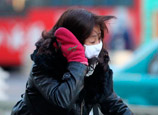
After years of development with heavy consumption of energy and emission of pollutants, the district is now trying to achieve both industrial development and ecological progress.
"We should use our iron fists to deal with polluting projects, even at the cost of losing an industrial product worth 3 billion yuan (about 477 million U.S. dollars) and shut down technologically backward plants," said Hua Wei, head of the Beilun district government.
In recent years, the district has closed more than 10 medium-sized and large companies and 62 small factories, and spent nearly 10 billion yuan (about 1.59 billion U.S. dollars) on handling industrial waste. The forestry coverage rate of the district is 48.9 percent.
"The air quality of Beilun is the best this year since monitoring began seven years ago," said Zhang Hongfeng, deputy director of the Beilun District Environmental Protection Bureau.
"Environment resource is a competitive strength and productive force," she told Xinhua.
The Ningbo Hangzhou Bay Zone, north of Ningbo, boasts a state-level export processing zone and a provincial-level economic development zone. A 43.5-square-km wetland, not very far from the development area, has various species of wild birds.


















![]()
